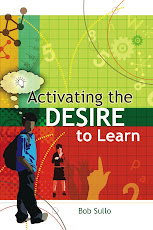Adults rightfully want children to take responsibility for
their actions. I’m guessing the
following scenarios are familiar to you:
- Cassandra,
a second grade student, is doodling rather than completing her work in
class. A competent student, Cassandra frequently squanders time and has
been spoken to by her teacher on numerous occasions. Today, her teacher
says, “Cassandra, I see you’ve chosen not to go out for recess with your
classmates today.”
- DeShawn
frequently disrupts class. Today is no exception. His teacher has had
enough and announces, “OK DeShawn, I guess you’ve decided you want to
spend some time with me after school today. I’ll see you for thirty
minutes after dismissal.”
- Jocelyn
has been told repeatedly to clean her bedroom. Her mother believes it’s
reasonable to require a 13-year-old to keep her room tidy. After repeated
warnings, Jocelyn’s mother tells her, “I can see by looking at your room
that you’ve decided not to go to the dance Friday night.”
If you were to question the adults in these examples, they
would likely tell you they are trying to teach responsibility. Nothing wrong
with that. But the adults have done more than ask kids to take responsibility
for their behavior. In each case, they abdicate their responsibility by asking
the kids to take ownership for what the adult has chosen to do!
Cassandra has chosen not to complete her work in class.
That’s her behavior and she owns it. But to suggest that Cassandra has chosen to miss recess is both inaccurate and unfair! Her
teacher has made that choice. The imposition of the consequence belongs to the
teacher, not the student.
DeShawn decided to disrupt class. No one “made” him do it.
Some unpleasant consequence may be reasonable, but it’s a distortion of
enormous proportions to suggest to DeShawn that “you’ve decided you want to
spend some time with me after school today.” That’s not DeShawn’s decision.
That’s the teacher’s decision. Left to his own devices, DeShawn would disrupt
as he pleases and might be the first one out the door at the end of the school
day.
And Jocelyn certainly didn’t decide “not to go to the dance
Friday night.” Her mother imposed that consequence because Jocelyn chose not to
keep her room tidy.
Too often we adults intimate to kids that they have choice (and the accompanying responsibility) but
we have no choice (and therefore no
responsibility). It’s not uncommon for adults say things like this: “When
Gloria turned in her report late, I had no choice but to deduct ten points from
her grade,” or “When Tyson spoke out in class for the third time without
permission, my only option was to send him to the office.” Put simply, that’s
just not true.
It may be Gloria’s choice to turn in her paper late, but the
adult (not the child) chooses the ten-point deduction. The “I had no choice”
argument is false and disingenuous. It’s appropriate to ask kids to take
responsibility for their actions. It’s equally important for us to do the same.
Gloria’s teacher had lots of options. She could have discussed the situation
with Gloria, ignored the deadline, offered an extension, given Gloria one more chance,
deducted twenty points from her grade, called her parents, given her no credit
for work turned in late, referred her to the counselor, etc. Some of those
possibilities might strike you as foolish. It doesn’t matter. What matters is
this: just as the child had choices, so did the adult.
When DeShawn disrupts class, the teacher can assign a
detention, speak privately with DeShawn, make a sarcastic comment designed to
humiliate DeShawn into compliant behavior. He can ignore the disruption, move
DeShawn’s seat, send him out of class, cajole him, call his parents, etc.
DeShawn doesn’t choose a detention. The
teacher does.
Returning to our original scenarios, let’s consider an
alternative way the adult could have handled each situation:
- Cassandra,
a second grade student, is doodling rather than completing her class work.
A competent student, Cassandra frequently squanders time in class and has
been spoken to by her teacher on numerous occasions. Today, her teacher
says, “Cassandra, since you’ve decided not to complete your work in class
this morning, I’m going to have you stay here with me during recess to
finish it. Once it’s
complete, you can join your classmates outside.”
- DeShawn
frequently disrupts class. Today is no exception. His teacher has had
enough and announces, “OK DeShawn, I’ve spoken to you numerous times about
your behavior. I’ll see you after school today. Hopefully, we can figure
out how to solve this problem.”
- Jocelyn
has been told repeatedly to clean her bedroom. Her mother believes it’s
reasonable to require a 13-year-old to keep her room tidy. After repeated
warnings, Jocelyn’s mother tells her, “Remember what I said, Jocelyn. You
didn’t clean your room so you can’t go to the dance this Friday. I know
you’re angry, but I expect you to take care of your room.”
See the difference? In these cases, the adult imposes a
consequence but “owns” it instead of unfairly shifting responsibility to the
child. Rather than asking the child to be responsible for the behavior of both parties, the adult is accepting responsibility for
what they choose to do.
I chose the consequences in these examples only because they
are “typical.” I’m not suggesting they are appropriate or inappropriate. The
actual consequence is not especially important for this discussion. What is
important is communicating with kids in a way that helps they take
responsibility for their choices while we continue to take responsibility for
ours.
***
As always, if you enjoyed this and found it useful, please
send the link to your friends. Thanks.
Bob Sullo
PO Box 1336
Sandwich, MA 02563
For information about books by Bob Sullo and
to schedule a keynote, workshop, or series for your school, agency, or parent
group visit www.internalmotivation.net





